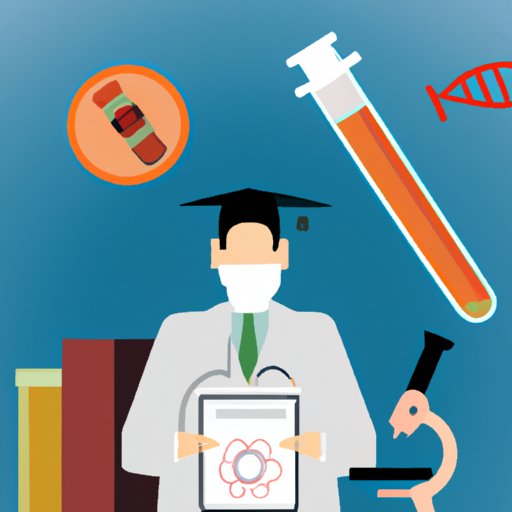Introduction
Medical technology is a rapidly growing field that offers a wide range of job opportunities and career paths. Individuals who have a degree in medical technology can work in hospitals, laboratories, and other healthcare settings, pursue graduate studies, become a clinical research coordinator, explore job opportunities with pharmaceutical companies, or teach medical technology courses at colleges and universities. This article will explore what can be done with a medical technology degree, and provide an overview of the job opportunities available in the field.

Working as a Medical Technologist in Hospitals and Laboratories
Medical technologists are responsible for performing laboratory tests on patient samples to help diagnose and treat diseases. They use sophisticated equipment to analyze blood, urine, and tissue samples and record their findings in medical records. Working as a medical technologist requires a bachelor’s degree in medical technology, laboratory science, or a related field, as well as certification from a recognized accrediting body. Typical duties and responsibilities of a medical technologist include collecting and preparing specimens, operating laboratory equipment, performing tests, interpreting test results, and reporting findings to physicians and other healthcare professionals.
Pursuing Graduate Studies in Medical Technology
Individuals who have a degree in medical technology may choose to pursue graduate studies in the field. There are several types of graduate programs available, including master’s degrees in medical technology, doctorate degrees in medical technology, and certificates in specific areas such as genetics or cytotechnology. Pursuing a graduate degree in medical technology provides students with advanced knowledge of the field, which can lead to higher-level positions and greater job opportunities. Additionally, a graduate degree can provide individuals with the opportunity to specialize in a particular area of medical technology.

Becoming a Clinical Research Coordinator
Clinical research coordinators are responsible for overseeing the planning and implementation of clinical trials. They develop protocols for clinical trials, coordinate data collection, monitor patient safety, and ensure compliance with regulations. To become a clinical research coordinator, individuals must have a bachelor’s degree in medical technology or a related field, as well as experience working in a healthcare setting. Typical duties and responsibilities of a clinical research coordinator include recruiting participants, collecting and analyzing data, preparing reports, and presenting results to sponsors and other stakeholders.
Exploring Job Opportunities with Pharmaceutical Companies
Pharmaceutical companies offer a variety of job opportunities for individuals with a degree in medical technology. These jobs include clinical research associates, product managers, regulatory affairs specialists, and medical writers. To work with a pharmaceutical company, individuals must have a bachelor’s degree in medical technology or a related field, as well as relevant experience in the industry. Typical duties and responsibilities of these jobs include developing protocols for clinical trials, reviewing and approving documents, monitoring patient safety, and ensuring compliance with regulations.

Teaching Medical Technology Courses at Colleges and Universities
Individuals who have a degree in medical technology may also choose to teach medical technology courses at colleges and universities. Teaching medical technology courses provides individuals with the opportunity to share their knowledge and expertise with others. To teach medical technology courses, individuals must have a master’s degree in medical technology or a related field, as well as experience in the field. Typical duties and responsibilities of a medical technology instructor include designing and delivering lectures, creating exams and assignments, evaluating student performance, and providing feedback to students.
Conclusion
A degree in medical technology opens up a world of possibilities for individuals seeking to make a difference in the lives of others. With a degree in medical technology, individuals can work as medical technologists in hospitals and laboratories, pursue graduate studies in the field, become a clinical research coordinator, explore job opportunities with pharmaceutical companies, or teach medical technology courses at colleges and universities. No matter which path they choose, individuals with a degree in medical technology can find fulfilling and rewarding careers in the field.
(Note: Is this article not meeting your expectations? Do you have knowledge or insights to share? Unlock new opportunities and expand your reach by joining our authors team. Click Registration to join us and share your expertise with our readers.)
